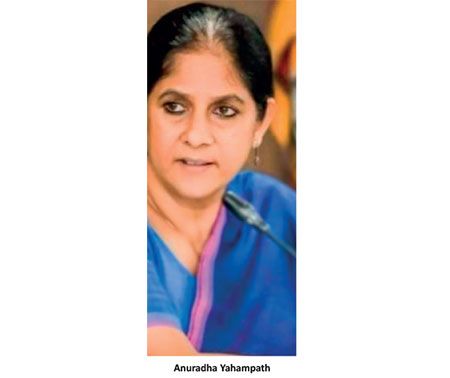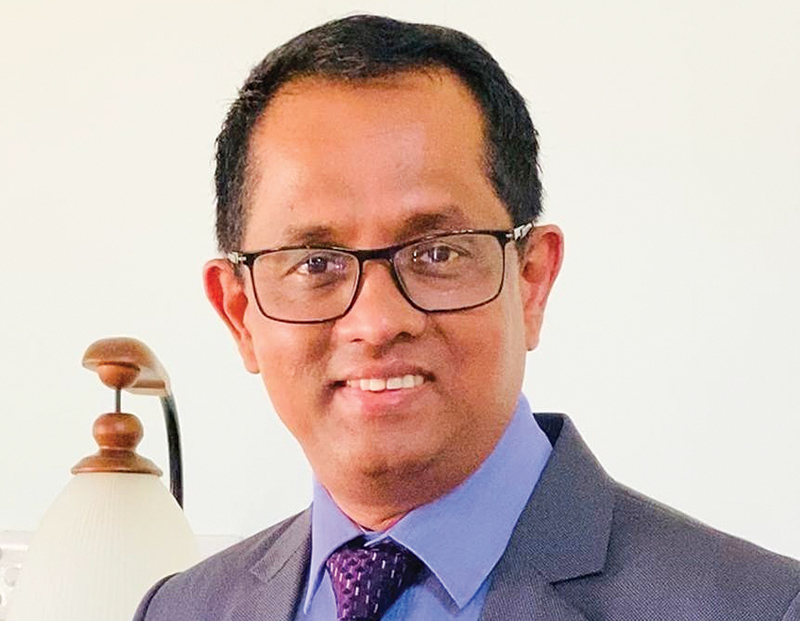News
Eastern Province Governor instructs local bodies to produce organic fertiliser

Eastern Province Governor Anuradha Yahampath on Wednesday issued instructions to the heads of all local government bodies in her province to launch projects to produce organic fertilisers making use of the biodegradable waste.
Addressing the heads of local government bodies using Zoom technology, the Governor instructed those who were already engaged in producing organic fertiliser to make proposals to improve their production.
The meeting was held to discuss the government’s decision to replace chemical fertilisers with organic fertilisers.
The Governor told the heads of local government bodies which did not collect sufficient bio-degradable waste for producing organic manure to come up with suggestions for alternative inputs.
She also instructed the provincial Agrarian Commissioner to make arrangements to introduce projects for each and every farmer association in the province to produce fertilisers themselves.
Chief Secretary of the province, secretaries to the provincial ministries, Local Government Commissioner, Assistant Local Government Commissioners, mayors and chairmen of pradeshiya sabhas in the province attended the meeting.
News
President proposes; Speaker disposes

AKD’s request to Harsha:
Speaker Dr. Jagath Wickramaratne has frustrated an attempt by Chairman of the Committee on Public Finance (CoPF) Dr. Harsha de Silva, MP, to intervene to settle the continuing dispute over the appointment of a new Auditor General.
Dr. De Silva yesterday told The Island he had recently written to all members of the Constitutional Council (CC) drawing their attention to the urgent need to address the issue at hand. The AG’s position remains vacant since 08 Dec, 2025. AG W.P.C. Wickremanayake retired in April and since then there have been a couple of Acting appointments. The CC has declined to endorse any of President Dissanayake’s nominees as the AG.
Asked whether he had taken up the issue with the CC following President Anura Kumara Dissanayake soliciting his support in this regard, MP de Silva said that he had written to CC members as agreed with the President.
The former UNPer and one-time State Minister said: “I did so, giving due respect to CC’s independence, underscoring the critical importance in them working with the President to resolve the crisis. I alluded to the need to have transparency in public financial management during this post-cyclone period where large amounts of funds are being transacted on multiple fronts, both domestic and foreign.”
Responding to another query, Dr. De Silva emphasised that he had clarified that the President must send the names of qualified and experienced persons to the CC for consideration. “However, these letters were returned to me by the Speaker, without being delivered to members of the CC. The Speaker didn’t give an explanation. Thus, except for members who are MPs who had been copied via email by my committee office, others never received my letter of concern. Even though I questioned, in Parliament, the basis of his refusal to forward my communication to the members of the CC of which he is Chairman, no answer was given.”
The CC consists of Dr. Jagath Wickramaratne, Speaker and Chairman of the 10-member body. Dr. Harini Amarasuriya, Prime Minister, Sajith Premadasa, Leader of the Opposition, Bimal Rathnayake, Aboobucker Athambawa, Ajith P. Perera, Sivagnanam Shritharan, and three civil society members namely Dr. Prathap Ramanujam, Dr. Dilkushi Anula Wijesundere and Dr. Dinesha Samararatne. None of the President’s nominees could obtain CC’s approval as all of them were rejected by the CC.
The present CC was introduced by the 21st Amendment to the Constitution which was endorsed on 31 October 2022.
Both the Bar Association of Sri Lanka (BASL) and the Transparency International Sri Lanka Chapter recently requested President Dissanayake, in writing, to propose a suitable person to the post of AG. The BASL, in another statement that dealt with the forthcoming vacancies in the CC due to three civil society members completing their terms, declared its concern over possible attempts by the President and the NPP government to fill the vacancies with rubber stamps.
The three civil society members will complete their terms on 18 January. In terms of Article 41E of the Constitution, the CC meets at least twice every month, and may meet as often as may be necessary. The Chairman presides at all meetings of the CC and in the absence of the Chairman, the Prime Minister, and in the absence of the Prime Minister, the Leader of the Opposition presides at the meetings of the CC.
Asked whether the CC could be disrupted due to the end of civil society members’ terms, an authoritative official pointed out that in case new appointments were not made the current members could continue.
The Parliament has not so far called for applications to fill the forthcoming vacancies.
by Shamindra Ferdinando ✍️
News
Sri Lanka loses Rs.7.5 bn due to coal tender irregularities: FSP

The NPP government’s coal procurement process has once again come under scrutiny following allegations by the Frontline Socialist Party (FSP) that substandard coal has been imported for power generation and that tender procedures were manipulated to favour a specific supplier.
Addressing the media after a party meeting in Maharagama on Saturday, FSP Education Secretary Pubudu Jagoda said a test report issued by the government laboratory at the Lakvijaya Power Plant had confirmed that the latest coal shipment unloaded in Sri Lanka did not meet the required quality standards. According to the report, the coal’s calorific value ranged between 5,600 and 5,800 kilocalories per kilo, below the 5,900–6,200 kCal/kg range specified in tender requirements.
Jagoda warned that lower calorific value coal would require higher volumes to generate the same amount of electricity, increasing costs significantly. Preliminary estimates, he said, indicated an additional financial burden of around Rs. 7,500 million, which might eventually be passed on to consumers through higher electricity tariffs.
The FSP also accused the government of tailoring procurement rules to benefit the Indian supplier, which has deposited bonds for long-term coal supply for the upcoming season. Jagoda alleged that tender conditions had been altered to accommodate the company, pointing to changes in coal reserve requirements. Under the 2021 Sri Lanka Coal Registration Document, suppliers were required to maintain a minimum reserve of one million metric tonnes with a gross calorific value of 5,900 kCal/kg. This threshold, he said, had been reduced to 100,000 metric tonnes in the 2025 document which is a 90% reduction raising serious concerns.
He further cited past allegations against the Indian company, including findings in a 2016 Auditor General’s report that the company violated procurement guidelines regarding a rice supply contract with Sathosa in 2014. Jagoda also referred to legal issues involving individuals linked to the company, and the suspension of a representative by the International Cricket Council in 2019 over match-fixing allegations.
Beyond company-specific concerns, Jagoda criticised what he described as systemic manipulation of the coal tender process. He questioned why the coal tender, typically called in February or March, was delayed until July, despite electricity being declared an essential service. He also alleged that the tender submission period had been progressively shortened from the internationally accepted six weeks to five weeks, and now reportedly to three giving an unfair advantage to suppliers with existing stock.
The Ministry of Energy has recently issued an amended tender to procure 4.5 million metric tonnes of coal for the Lanka Coal Company for the 2025/26 and 2026/27 periods, following the cancellation of an earlier tender.
Jagoda warned that delays and irregularities could lead to coal shortages, higher spot market purchases, increased electricity costs, and even power cuts if hydropower generation falls short. He called for urgent investigations into the procurement process, insisting that the burden of alleged mismanagement and corruption must not be transferred to the public.
by Chaminda Silva ✍️
News
CID summons SJB MP for criticising education reforms

SJB Gampaha District MP Prasad Siriwardhana has been summoned to the CID today (12) for questioning in connection with a statement he made on a private television channel regarding education reforms.
He was earlier asked to report to the CID on 10 January to make a statement. However, as Siriwardhana had notified the authorities that he was unable to appear on that day, he was subsequently asked to come today.
Siriwardhana is one of the critics of the shortcomings of the education reforms introduced by the NPP government.
-

 News1 day ago
News1 day agoSajith: Ashoka Chakra replaces Dharmachakra in Buddhism textbook
-

 Business1 day ago
Business1 day agoDialog and UnionPay International Join Forces to Elevate Sri Lanka’s Digital Payment Landscape
-

 Features1 day ago
Features1 day agoThe Paradox of Trump Power: Contested Authoritarian at Home, Uncontested Bully Abroad
-

 News6 days ago
News6 days agoInterception of SL fishing craft by Seychelles: Trawler owners demand international investigation
-

 News1 day ago
News1 day agoLevel I landslide early warnings issued to the Districts of Badulla, Kandy, Matale and Nuwara-Eliya extended
-

 Features1 day ago
Features1 day agoSubject:Whatever happened to (my) three million dollars?
-

 News6 days ago
News6 days agoBroad support emerges for Faiszer’s sweeping proposals on long- delayed divorce and personal law reforms
-

 News1 day ago
News1 day ago65 withdrawn cases re-filed by Govt, PM tells Parliament













